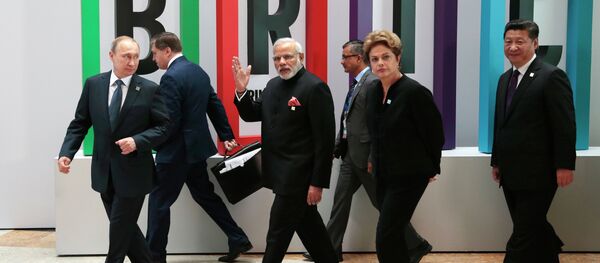WASHINGTON (Sputnik), Leandra Bernstein — The BRICS nations of Brazil, Russia, India, and South Africa will likely undergo currency devaluations as a short-term consequence of the market turmoil in China, experts told Sputnik.
"The short-term impact is mostly bound to a new round of devaluations of the Russian ruble and other commodity currencies, such as the Brazilian real and South African rand," BRICS Business Magazine editor Vladimir Volkov said on Tuesday.
Since early July, the Chinese stock market has experienced large-scale sell-offs and instability, culminating in the largest single day loss on Monday.
On August 11, Chinese authorities responded to the ongoing volatility by devaluing the yuan, triggering a decline in commodity prices worldwide, and subsequent losses to commodity export-dependent currencies.
Over the long-term, the BRICS will be greatly affected by the "overdue correction" in the Chinese economy toward anticipated lower rates of growth, Volkov noted.
He concluded that the projected slowdown of the Chinese economy "is not good news for Russia and other BRICS commodity-exporting nations."
"I do not expect to see a major impact of China on the economic performance of the other BRICS," Troyjo stated.
Over the upcoming 12 months the director does not anticipate China’s demand for commodities "cooling off in a significant way."
Even if Chinese growth is rebalanced to 6.5 percent of gross domestic product, down from a 2010 high of nearly 12 percent, it is "still very impressive" and will continue to fuel high rates of consumption, Troyjo noted.
Nations driven by commodity sales should avoid blaming the current instability in China for reduced demand for commodities, he cautioned.
"Countries like Brazil or Russia or [other commodity exporters] will not be able to blame what they might characterize as a Chinese crisis as the mother of all evils to the economic pains they are experiencing at present," Troyjo said.
He explained that the surplus in commodities on the world market as well as the domestic economic troubles in those countries must be taken into account.
Both Troyjo and Volkov noted that there remains looming uncertainty over how Beijing will respond to its market crisis.
China is the world’s largest trading nation responsible for more than 15 percent of global GDP.


